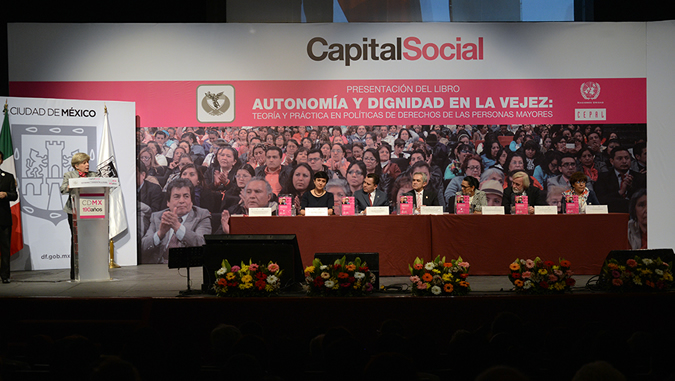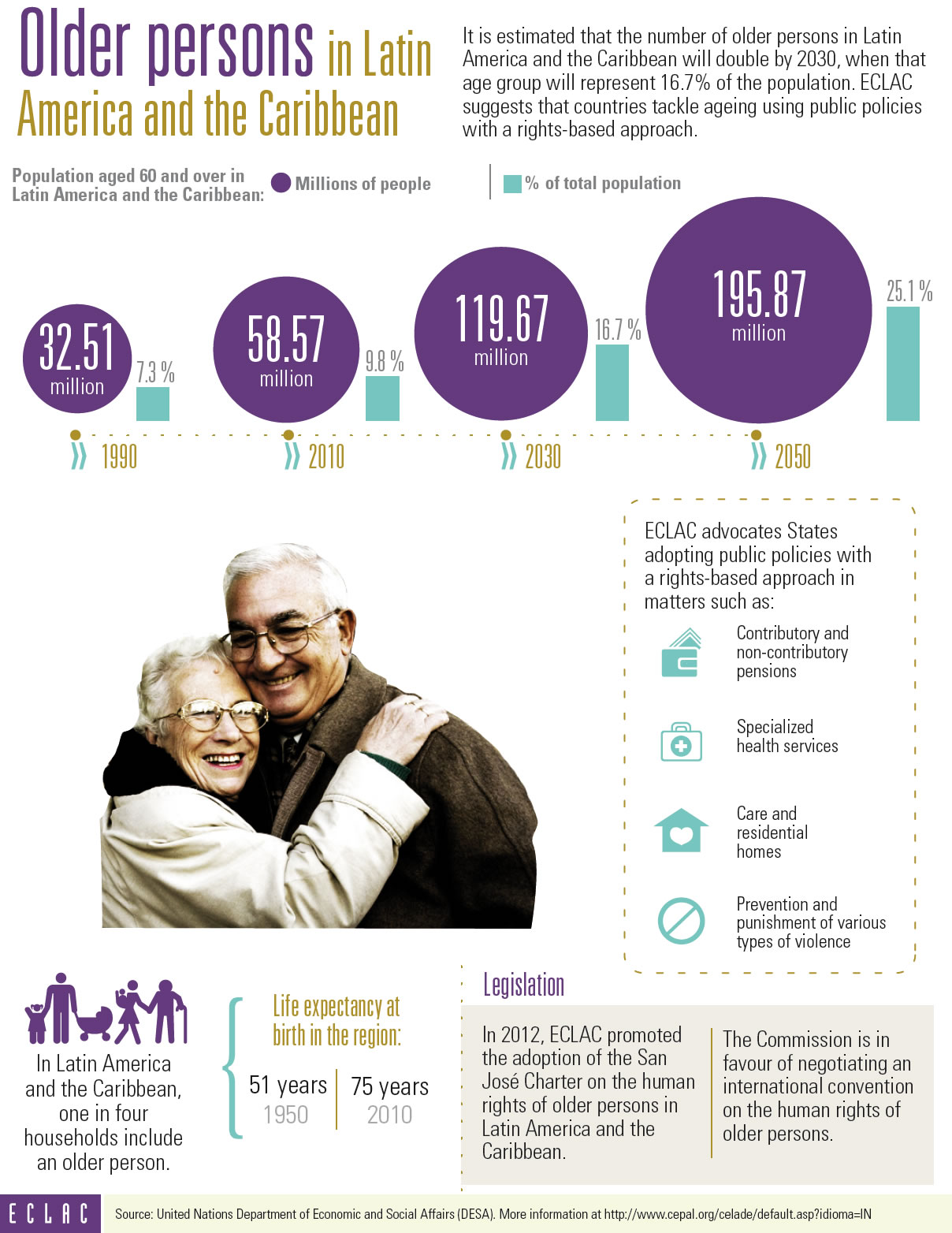ECLAC and Mexico City Call for Guaranteeing the Rights, Autonomy and Dignity of Older Persons
Work area(s)
The regional United Nations organization and the Mexican capital’s municipal Government presented a joint book on this topic.

The Economic Commission for Latin America and the Caribbean (ECLAC) and the Government of Mexico City called on others to protect the rights, autonomy and dignity of older persons, putting special emphasis on the current context of an aging population, during the presentation of a joint book on this topic that was held in the Mexican capital.
ECLAC’s Executive Secretary, Alicia Bárcena, and the Mayor of Mexico City, Miguel Ángel Mancera, spoke on March 9 during the presentation of the book Autonomy and Dignity in Old Age: Theory and Practice on Policies for Older Persons’ Rights, edited by Sandra Huenchuan, a specialist on aging at ECLAC’s Latin American and Caribbean Demographic Center (CELADE)-Population Division, and Rosa Icela Rodríguez, Social Development Secretary in the Government of Mexico’s Federal District.
Alicia Bárcena said that this publication is centered on the three main themes that underlie the concept of equality proposed by ECLAC: rights, autonomy and dignity. She stressed that these are essential principles for designing laws, policies and programs for older people.
“There are numerous strategies for advancing toward equality, such as labor policies, through instruments like the minimum wage; social protection, through non-contributory pensions; recognition of the work done by caretakers; and access to credit for older persons,” the Executive Secretary added.
ECLAC’s most senior representative said it is important to protect the lives of older people with dignity and equality because contemporary society needs references in terms of values, culture and identity, and because the urgent reparation of Mexico’s social fabric requires tapping into their wisdom, knowledge and experience.
Alicia Bárcena added that more than a decade ago Mexico City introduced the concept of universal rights when it began providing a food stipend to citizens 70 years and older, and she said that it is the only city in the world that offers a non-contributory pension to all people starting at age 68.
Meanwhile, Miguel Ángel Mancera highlighted that Mexico City uses numerous public policy instruments to tend to older persons, among which he cited tourism programs, free movies, home-based medical visits, a network of specialized schools, and tax incentives for hiring older people. In addition, he said that in collaboration with ECLAC officials are developing a program to train workers to care for older persons and help them get remunerated for performing these tasks.
Rosa Icela Rodríguez pointed out that 13.14% of the capital’s population is 60 years or older and life expectancy averages 76 years of age. In addition, she said that Mexico City has the highest rate of migration of older persons in the country, due in large part to the public policies tailored to them.
At the same time, Sandra Huenchuan lamented that old age can sometimes provoke discrimination or the infringement of rights. “We have to try to provide broader protection for the human rights of older persons through institutional, legislative and judicial measures,” she emphasized.
About 71 million people above 60 years of age currently live in Latin America and the Caribbean, and it is estimated that by 2040 older people will outnumber children. Between 1950 and 2010, life expectancy from birth rose 24 years (from 51 to 75) in the region, and that figure is forecast to increase to 81 years of age by mid-century.
The book presented today brings together the studies and conclusions from the Second International Forum on the Human Rights of Older Persons, which took place in Mexico City in June 2014. It addresses, among other issues, international progress on protecting the human rights of older people, the jurisdictional and institutional guarantees for exercising these rights, and the care and social services provided to strengthen this group’s autonomy.
The forum held in Mexico was part of the process of implementation and follow-up to the San José Charter on the rights of older persons in Latin America and the Caribbean, which was adopted in 2012. It is hoped that this publication can contribute to an international convention on the human rights of older persons.
Other officials who attended the book presentation included the Director of ECLAC’s CELADE-Population Division, Dirk Jaspers; the Director-General of Mexico City’s Institute for Tending to Older Adults, Rocío Bárcena; and Manuel Granados, President of the Government Committee at the Federal District’s Legislative Assembly.
Related content

Older persons in Latin America and the Caribbean
It is estimated that the number of older persons in Latin America and the Caribbean will double by 2030, when that age group will represent 16.7% of the population. ECLAC suggests that countries…

Presentación del Libro “Autonomía y dignidad en la vejez: Teoría y práctica en políticas de derechos de las personas mayores”
Intervención de Alicia Bárcena, Secretaria Ejecutiva de la CEPAL.
Related link(s)
Contact
Public Information Unit
- prensa@cepal.org
- (56 2) 2210 2040